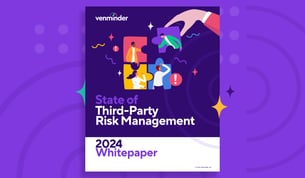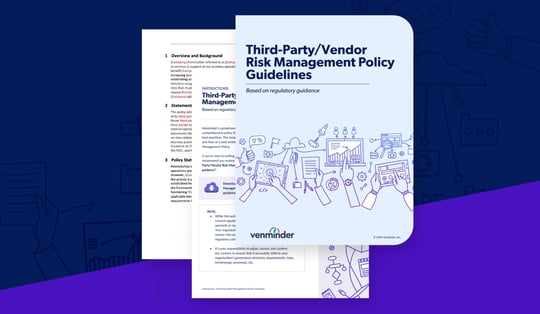During our recent three day Vendor Management Bootcamp, we had a lot of GREAT questions come in. It was simply impossible to get to them all during the live sessions, so we have worked with the various speakers to compile the answers and make them available for all here.
Below you will find the questions and the speaker responses from Day 3, Sessions 1 and 3.
Answers kindly provided by:
 |
 |
|
Branan Cooper
Chief Risk Officer
Venminder, Inc.
|
Michael Bowers
Chairman
Venminder, Inc.
|
Third Party Risk Policy and Program Q&A
Q1: What's the definitions of a mature and very mature vendor management program?
Answer: "A mature vendor management program is one that has fully functioning resources in place to address each of the pillars of the regulatory guidance. One that has a well-scoped set of documents and a list of all actively managed vendors. Very mature would be this same program in place, examined and with no major findings waiting to be remediated, over a period of time."
For more information on developing a vendor management policy, program and procedures, download our umbrella infographic series.
Q2: For policy and tracking purposes, can you define what a "vendor" is? We can't decide if it's necessary to track every company that provides some sort of service to us or if it's ok to have exceptions? For example: landscapers, coffee service, etc.
Answer: "Generally, all service providers should be considered, though you can typically set a spend threshold or a one time use or minimal risk provision in place. Consider any company providing a product or service to the institution or on behalf of the institution to the customer. In other words, anyone involved in the delivery of product or service – regardless of where they are in the "food chain", should be considered. "
Q3: Do most credit unions include all of the law firms they may work with in their vendor management program? For example: collection attorney's, HR attorney's, contract attorney's.
Answer: "I (Branan) would certainly recommend including any that are more than one time use. So, generally, yes, particularly pay attention to the reputation risk posed by the law firm as well as their information secruity practices."
Q4: We manage risk on a contract by contract basis (rather than by vendor). Is that representative of other Enterprises?
Answer: "Yes, we advise you to look at each and every contract as unique. If you were simply to look at a vendor like FIS at the vendor level, you would fail to appreciate the significant differences between the various platforms underneath, e.g., regulatory univ as a minimal risk vs the higher risks posed by a core processing platform. "
Financial Health Q&A
Q1: Are you advocating writing vendor financial health into the SLAs of the contract?
Answer: "No. It would be a great idea, but the practically of establishing definitions and getting the larger vendors to agree is problematic."
Q2: We have a vendor that will not provide financials. What can we do, if anything?
Answer: "Although this is becoming less and less of a problem, most vendors understand the requirement. Your trump card: you are the customer. If they want to keep your business they need to supply financials. The default here is to get a D&B report."
Q3: Do you consider a D&B adequate for financial health review?
Answer: "In most cases (especially critical vendors) it's not enough. It should be considered a review of last resort. Tax returns are a better solution. "



















